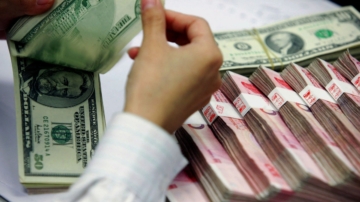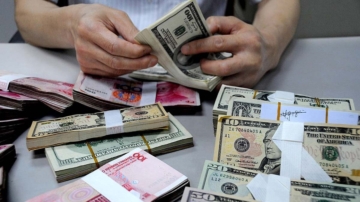【新唐人2015年2月16日讯】国际谘询机构麦肯锡全球研究院(McKinsey Global Institute),最近发布了一份研究报告,指出中国的总债务水平,在2007年的金融危机之后翻了四倍,远高于发展中国家的平均水平,甚至比很多发达国家还要高,引发投资者担忧。中国专家指出,中国经济比1980年代的日本经济危机时更加糟糕。
谘询机构麦肯锡全球研究院的调查报告显示,中国2007年以来负债增加将近4倍,从当年的7.4万亿美元增加到了28.2万亿美元,相当于2014年GDP的282%。
报告指出:中国一半的贷款用于过热的房地产市场,不受监管的影子银行占了近一半的新增贷款,而许多地方政府的债务又不可持续。这三方面都令人担忧。
报告还指出,短短几年之内中国从负债最少的国家之一,变成负债较多的国家之一,比澳大利亚、美国和德国等发达国家还高出许多。
英国广播公司《BBC》指出,中国的情况不符合发展中国家负债比发达国家少的常识,令人惊讶。
台大经济系教授张清溪:“我觉得还有一些东西,可能没有算进来,因为地方政府的债务是不是能够真的表现出来,我是有点怀疑,因为中国现在就是非常不透明,很难拿到它正确的资料,中央政府可能也不是很清楚,因为很多实际在地方政府里面的。”
中国社科院学部委员馀永定指出,大多数金融危机都是债务危机,一个国家整个债务对GDP之比非常重要,在中国最危险、最值得关注的是地方政府债务,因为不知道其馀额到底是多少,馀永定对地方政府还债意愿及还债能力表示怀疑。
按照麦肯锡的计算,在一半的房地产债务发生债务违约,价值损失80%的情况下,中国的政府债务必须提高到GDP的79%,才能挽救这场危机。
大陆经济学家杨斌:“79%难度太大了,不光金融危机的问题,现在实体经济都特别脆弱了,现在各种指标出来都没有好的。”
大陆经济学家杨斌指出,目前强调的推迟10年社保与债务有直接关系。
英国广播公司《BBC》评论指出,这样的一场金融危机仍然会给中国经济带来灾难,中国会步上日本后尘,家庭和企业推迟消费,经济停滞不前也将成为常态。
张清溪:“日本的问题是因为泡沫的问题造成银行的问题,它(中国)的问题比日本要严重很多,尤其是地下金融,它的影子银行实际上不透明的东西,地方债务也一样是非常不透明,基本上中国经济要崩溃的啦,我觉得它不只是像日本一样停滞而已。”
上世纪80年代,在炒作之下,日本的地价迅速上涨,80年代后半期泡沫经济形成,日本经济呈现出高增长、“表面美丽”现象,1991年“泡沫经济”破灭后,日本经济陷入了长期停滞,并爆发了严重的金融危机,因而被称之为“失去的十年”。
杨斌:“GDP包括债务都可以跟人家比,人均收入就不能跟日本比,日本可以承受的中国可能承受不了,国内经济构成非常脆弱,因为贫富不均非常严重,就没有中产阶级用消费来拉动经济发展,日本没有崩溃,我们这面临各种危机,政治构成经济构成都特别脆弱。”
在大举借贷导致2007年至08年全球信贷危机,所引发的全球经济衰退以来,各国政府都誓言要缩减开支,降低债务。
不过,面临经济增长放缓的压力,尤其是房地产增速回落和制造业产能过剩,中共当局并没有遏制信贷发展。《中国经济时报》今年1月份的报导称,从去年11月开始,中国正在实施新一轮小型的刺激计划。根据中国人民银行的统计,截至去年年末,金融机构人民币各项贷款当年新增近10万亿元。
据经济学家观察,这些新增的贷款还是进入了房地产。根据《新华社》的资料,中国平均每户住房拥有率已经超过了100%。馀永定认为这是严重的资源错配,这样的发展会毁了中国。
采访编辑/刘惠
McKinsey: China Quadrupled Debt Reveals A Troubling Picture
Influential consultancy, McKinsey Global Institute, recently
published a new study stating that China's debt has quadrupled
since the financial crisis in 2007. That's far above the average
for developing countries and higher than some developed
countries, which really makes investors worried.
Economists from China state that China's economic situation
is a lot worse than that in Japan during its economic crisis.
According to the study , China's debt has quadrupled since 2007,
rising to $28 trillion by mid-2014, from $7 trillion in 2007.
It's equivalent to 282 percent of its GDP of 2014.
It stated that three developments are potentially worrisome:
half of all loans are linked, directly or indirectly,
to China's overheated real-estate market;
unregulated shadow banking accounts for nearly half of new
lending; and the debt of many local governments is probably
unsustainable.
The reports says that China's debt level is far above the average
for developing countries - higher than some advanced economies
including Australia, the United States, Germany and Canada.
According to the BBC, it is surprising to see China as a
developing country is even more indebted than the developed.
Zhang Qingxi, Economics Professor, National Taiwan University:
"I think China's total debt hasn't been completely calculated
because the debts of local governments aren't published.
Because of the lack of transparency, it's very challenging
to get accurate numbers. Even the central government
doesn't clearly know the debt situation of local governments."
Yu Yongding, committee member, China Academy of Social Sciences,
pointed out that much of the financial crisis is essentially debt crisis.
The ratio of a country's debt to its GPD is very important.
In China, the area that is most perilous and worth more attention
is local government debt. Not only is it hard to know the exact balance,
but its willingness and capability to pay off the debt is open to doubt.
Based on calculation from McKinsey, if half of the real estate
debt defaults, with 80% of non-recoverable loss,
China has to increase its debt level as much as 79% of its GDP
to save the crisis.
Yang Bin, economist from China:"It's too challenging to be
indebted as much as 79% of GDP.
It's not only about financial crisis,
but even entity economy is weak as well.
Now none of the economic indices look good."
Economist Yang Bin pointed out that China's postponing
social security benefit payment time for another 10 years is
directly correlated to its current debt situation.
Zhang Qingxi: "Japan's bubble problem caused its banking
problem.
Right now, China's problem is more severe than Japan's,
especially its underground finance and shadow banking
as well as local government debt. These are all not
transparent at all.
China's economy is about to collapse
and it will be worse than Japan."
In the 1980s, Japan's land price rose fast.
In the late 1980s, a bubble economy formed and
Japan's economy showed fast growth, "superficially beautiful.
In 1991, Japan's "bubble economy" fell apart and its economy
stagnated for a long time, which also triggered financial crisis.
That has been called "the lost 10 years".
Yang Bin: "Both China's debt and GDP is comparable to Japan.
Nonetheless, China's income per head is non-comparable to Japan.
China can't sustain what Japan can.
Right now China's economic structure is very weak.
Because of the severe income inequality,
consumption from the middle-class is not enough
to push economic development.
Even though Japan hasn't collapsed, we are facing all kinds
of crisis.
Both political structure and economic structure are very weak."
Since the bursting of a global credit bubble resulted in
the worst financial crisis in 2007, all countries vowed to cut
spending and lower debt level.
Facing the pressure from economic slowdown,
especially the slowdown of real estate industry and manufacture,
China's government hasn't constrained its debt level.
Based on the observation of economists,
newly issued debts have flown into real estate industry.
Based on the statistics from "Xinhuan Agency",
each household owns more than one property already.
Yu Yongjia states that this phenomenon means a mis-allocation
of resources, which will ruin China's economy.
Interview & Edit/Liu Hui
谘询机构麦肯锡全球研究院的调查报告显示,中国2007年以来负债增加将近4倍,从当年的7.4万亿美元增加到了28.2万亿美元,相当于2014年GDP的282%。
报告指出:中国一半的贷款用于过热的房地产市场,不受监管的影子银行占了近一半的新增贷款,而许多地方政府的债务又不可持续。这三方面都令人担忧。
报告还指出,短短几年之内中国从负债最少的国家之一,变成负债较多的国家之一,比澳大利亚、美国和德国等发达国家还高出许多。
英国广播公司《BBC》指出,中国的情况不符合发展中国家负债比发达国家少的常识,令人惊讶。
台大经济系教授张清溪:“我觉得还有一些东西,可能没有算进来,因为地方政府的债务是不是能够真的表现出来,我是有点怀疑,因为中国现在就是非常不透明,很难拿到它正确的资料,中央政府可能也不是很清楚,因为很多实际在地方政府里面的。”
中国社科院学部委员馀永定指出,大多数金融危机都是债务危机,一个国家整个债务对GDP之比非常重要,在中国最危险、最值得关注的是地方政府债务,因为不知道其馀额到底是多少,馀永定对地方政府还债意愿及还债能力表示怀疑。
按照麦肯锡的计算,在一半的房地产债务发生债务违约,价值损失80%的情况下,中国的政府债务必须提高到GDP的79%,才能挽救这场危机。
大陆经济学家杨斌:“79%难度太大了,不光金融危机的问题,现在实体经济都特别脆弱了,现在各种指标出来都没有好的。”
大陆经济学家杨斌指出,目前强调的推迟10年社保与债务有直接关系。
英国广播公司《BBC》评论指出,这样的一场金融危机仍然会给中国经济带来灾难,中国会步上日本后尘,家庭和企业推迟消费,经济停滞不前也将成为常态。
张清溪:“日本的问题是因为泡沫的问题造成银行的问题,它(中国)的问题比日本要严重很多,尤其是地下金融,它的影子银行实际上不透明的东西,地方债务也一样是非常不透明,基本上中国经济要崩溃的啦,我觉得它不只是像日本一样停滞而已。”
上世纪80年代,在炒作之下,日本的地价迅速上涨,80年代后半期泡沫经济形成,日本经济呈现出高增长、“表面美丽”现象,1991年“泡沫经济”破灭后,日本经济陷入了长期停滞,并爆发了严重的金融危机,因而被称之为“失去的十年”。
杨斌:“GDP包括债务都可以跟人家比,人均收入就不能跟日本比,日本可以承受的中国可能承受不了,国内经济构成非常脆弱,因为贫富不均非常严重,就没有中产阶级用消费来拉动经济发展,日本没有崩溃,我们这面临各种危机,政治构成经济构成都特别脆弱。”
在大举借贷导致2007年至08年全球信贷危机,所引发的全球经济衰退以来,各国政府都誓言要缩减开支,降低债务。
不过,面临经济增长放缓的压力,尤其是房地产增速回落和制造业产能过剩,中共当局并没有遏制信贷发展。《中国经济时报》今年1月份的报导称,从去年11月开始,中国正在实施新一轮小型的刺激计划。根据中国人民银行的统计,截至去年年末,金融机构人民币各项贷款当年新增近10万亿元。
据经济学家观察,这些新增的贷款还是进入了房地产。根据《新华社》的资料,中国平均每户住房拥有率已经超过了100%。馀永定认为这是严重的资源错配,这样的发展会毁了中国。
采访编辑/刘惠
McKinsey: China Quadrupled Debt Reveals A Troubling Picture
Influential consultancy, McKinsey Global Institute, recently
published a new study stating that China's debt has quadrupled
since the financial crisis in 2007. That's far above the average
for developing countries and higher than some developed
countries, which really makes investors worried.
Economists from China state that China's economic situation
is a lot worse than that in Japan during its economic crisis.
According to the study , China's debt has quadrupled since 2007,
rising to $28 trillion by mid-2014, from $7 trillion in 2007.
It's equivalent to 282 percent of its GDP of 2014.
It stated that three developments are potentially worrisome:
half of all loans are linked, directly or indirectly,
to China's overheated real-estate market;
unregulated shadow banking accounts for nearly half of new
lending; and the debt of many local governments is probably
unsustainable.
The reports says that China's debt level is far above the average
for developing countries - higher than some advanced economies
including Australia, the United States, Germany and Canada.
According to the BBC, it is surprising to see China as a
developing country is even more indebted than the developed.
Zhang Qingxi, Economics Professor, National Taiwan University:
"I think China's total debt hasn't been completely calculated
because the debts of local governments aren't published.
Because of the lack of transparency, it's very challenging
to get accurate numbers. Even the central government
doesn't clearly know the debt situation of local governments."
Yu Yongding, committee member, China Academy of Social Sciences,
pointed out that much of the financial crisis is essentially debt crisis.
The ratio of a country's debt to its GPD is very important.
In China, the area that is most perilous and worth more attention
is local government debt. Not only is it hard to know the exact balance,
but its willingness and capability to pay off the debt is open to doubt.
Based on calculation from McKinsey, if half of the real estate
debt defaults, with 80% of non-recoverable loss,
China has to increase its debt level as much as 79% of its GDP
to save the crisis.
Yang Bin, economist from China:"It's too challenging to be
indebted as much as 79% of GDP.
It's not only about financial crisis,
but even entity economy is weak as well.
Now none of the economic indices look good."
Economist Yang Bin pointed out that China's postponing
social security benefit payment time for another 10 years is
directly correlated to its current debt situation.
Zhang Qingxi: "Japan's bubble problem caused its banking
problem.
Right now, China's problem is more severe than Japan's,
especially its underground finance and shadow banking
as well as local government debt. These are all not
transparent at all.
China's economy is about to collapse
and it will be worse than Japan."
In the 1980s, Japan's land price rose fast.
In the late 1980s, a bubble economy formed and
Japan's economy showed fast growth, "superficially beautiful.
In 1991, Japan's "bubble economy" fell apart and its economy
stagnated for a long time, which also triggered financial crisis.
That has been called "the lost 10 years".
Yang Bin: "Both China's debt and GDP is comparable to Japan.
Nonetheless, China's income per head is non-comparable to Japan.
China can't sustain what Japan can.
Right now China's economic structure is very weak.
Because of the severe income inequality,
consumption from the middle-class is not enough
to push economic development.
Even though Japan hasn't collapsed, we are facing all kinds
of crisis.
Both political structure and economic structure are very weak."
Since the bursting of a global credit bubble resulted in
the worst financial crisis in 2007, all countries vowed to cut
spending and lower debt level.
Facing the pressure from economic slowdown,
especially the slowdown of real estate industry and manufacture,
China's government hasn't constrained its debt level.
Based on the observation of economists,
newly issued debts have flown into real estate industry.
Based on the statistics from "Xinhuan Agency",
each household owns more than one property already.
Yu Yongjia states that this phenomenon means a mis-allocation
of resources, which will ruin China's economy.
Interview & Edit/Liu Hui








